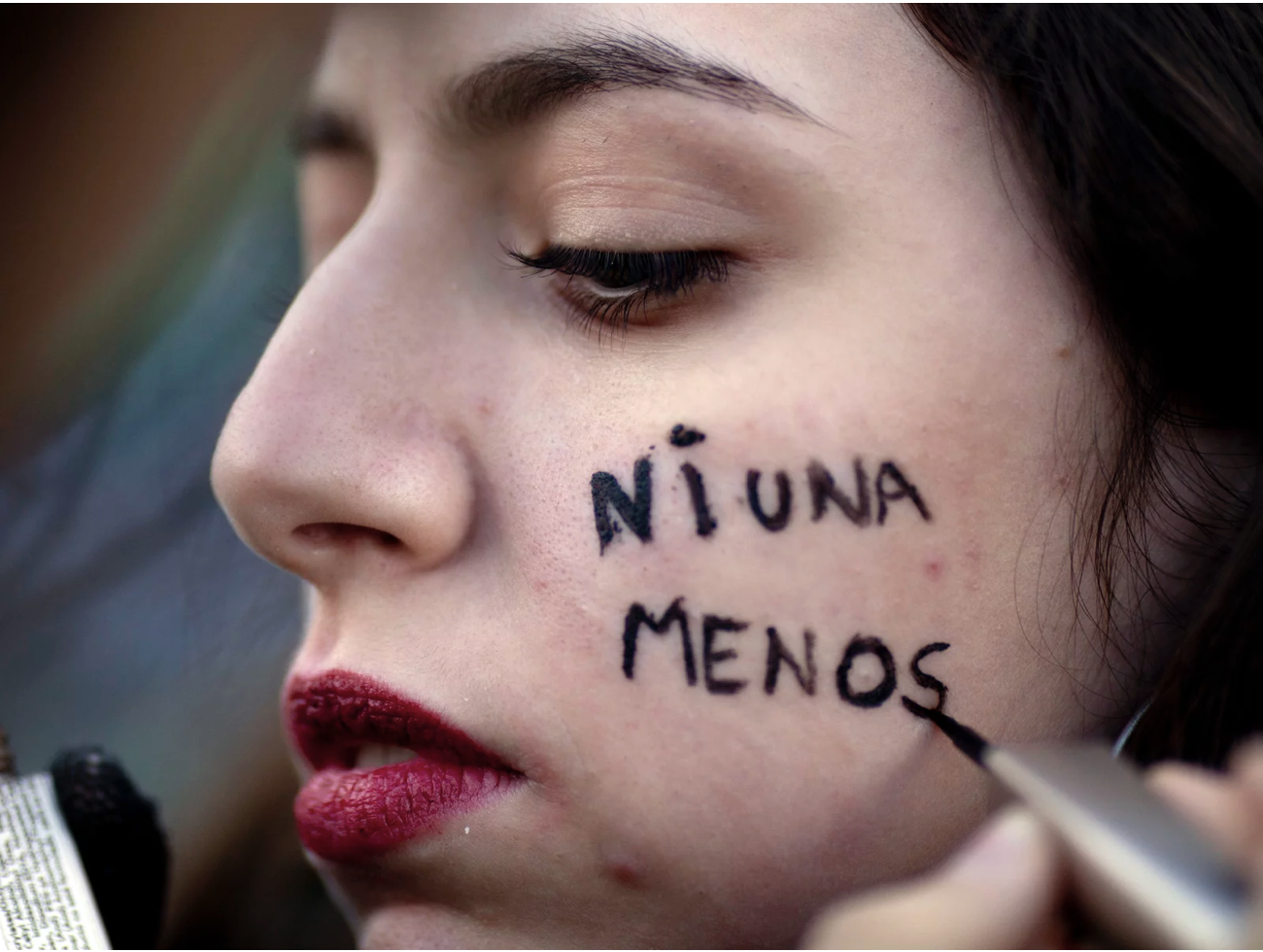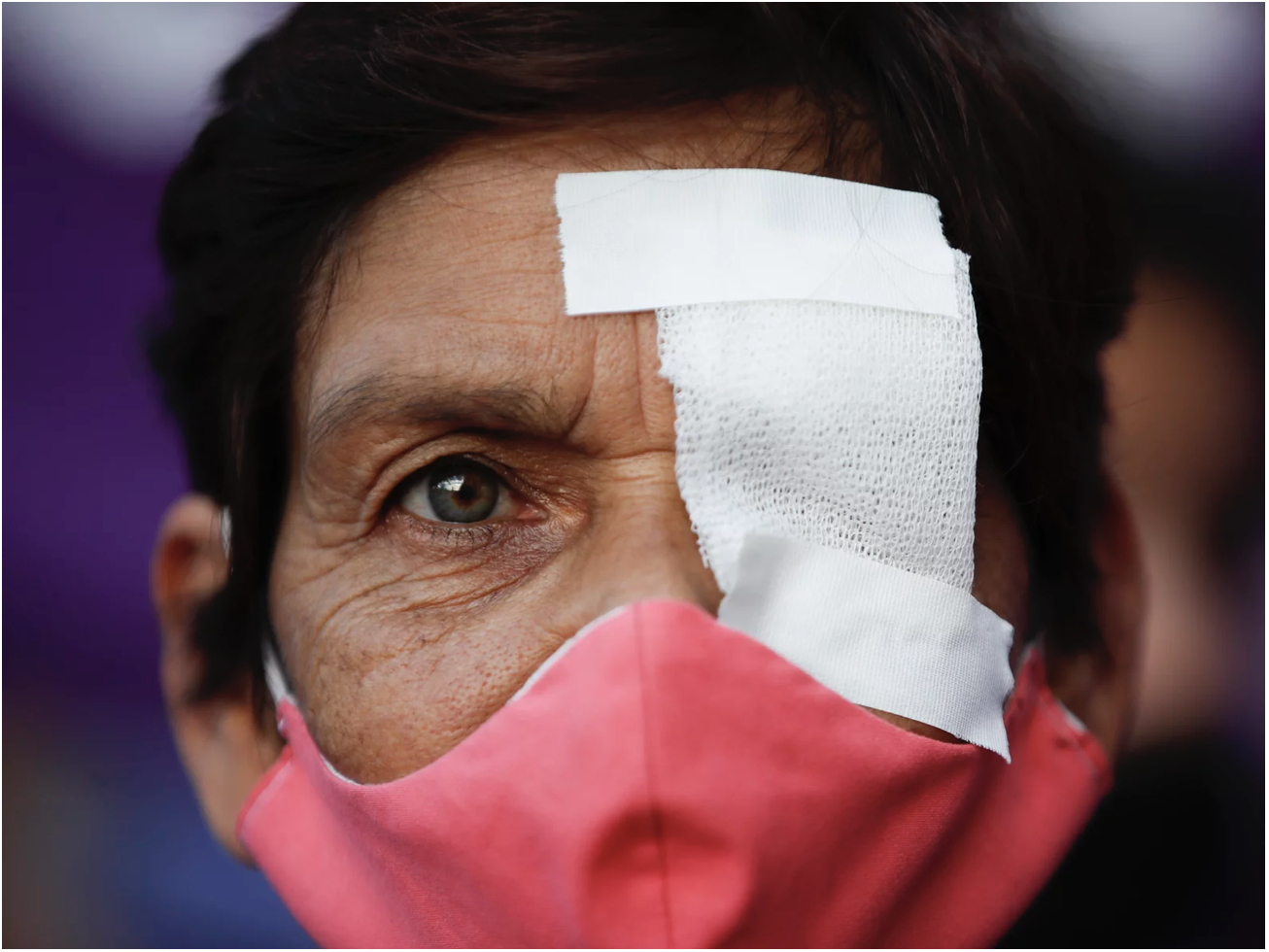Public Project
Ni Una Menos - Not One Less
Years later, "this massive mobilization was also able to draw attention to another longstanding fight which was reproductive health and rights," Ximena Casas tells NPR. She is an Americas Researcher for the women's rights division at Human Rights Watch in Madrid.
Activists in Latin America that emerged from this Ni Una Menos groundswell have successfully pushed for access to abortion in a traditionally conservative region, while continuing the work of the movement's original mission.
"In the past, regions such as North America and Europe have been at the forefront of movements to expand sexual and reproductive rights," Mariela Belski, the executive director for Amnesty International Argentina, told NPR. "However, it is currently the trans feminist movements in Latin America that are advancing discussions that place reproductive autonomy and gender justice at center stage."
Women going out into the streets to share their experiences, helped break down the stigma tied to abortion and reproductive health, said Casas, with Human Rights Watch in Madrid."Women started talking about their experiences or experiences of a friend. Families started talking about it at the dinner table. Everybody started realizing that they knew someone who had an abortion or they themselves had an abortion," Casas said. "This opened the door to start talking about these issues, that are a health issue, that for many many years was seen as a taboo."
The catalyst that gave birth to the Ni Una Menos movement was the killing of 15-year-old Chiara Paez by her 16-year-old boyfriend.
According to The Guardian: It has been five years since pent-up fury over staggering levels of violence against women erupted in a wave of public protest across Argentina under the slogan Ni Una Menos (Not One Less).
What started as a hashtag quickly grew into a movement, pushing women’s rights to the top of the agenda in Argentina, before quickly spreading across South America as millions of women took a stand against gender violence.
But five years later, Latin America remains one of the most dangerous places in the world for women. One in three women in the region have been subjected to violence and between 17% and 53% of women have reportedly experienced domestic violence. In recent weeks, strict coronavirus lockdowns across Latin America have compounded the problem, as women find themselves trapped at home with their abusers.Activists say the movement’s message is more urgent now than ever. Argentina’s largest newspaper, Clarín, published the names and stories of more than 300 women who have been murdered in the last year as part of a special obituary section.According to a United Nations commission, in 2022, at least 4,050 women were victims of femicide (also known as feminicide) in 26 countries and territories of Latin America and the Caribbean, according to the latest data that official agencies reported to the Gender Equality Observatory for Latin America and the Caribbean (GEO) of the Economic Commission for Latin America and the Caribbean (ECLAC). This is equivalent to one gender-related killing of a woman every two hours in the region.“It is not possible to identify an upward or downward trend in the rates of femicide or feminicide in each country, since the variations are small and do not reflect an increase or decrease in the problem,” ECLAC explains in a new report on this issue. However, the United Nations regional organization stresses, it can be affirmed that femicide persists in the region, despite greater public awareness, legislative advances, progress in the measurement of cases and the state response.Of the 19 countries and territories in Latin America that reported the number of femicides or gender-related killings of women in 2022, the highest rates were seen in Honduras (6.0 per 100,000 women), the Dominican Republic (2.9) and El Salvador and Uruguay (1.6). The lowest rates (meaning less than 1 victim per 100,000 women) were observed in Puerto Rico and Peru (0.9), Colombia (0.8), Costa Rica (0.7), Nicaragua (0.5), Chile (0.4) and Cuba (0.3).In the Caribbean, 46 women were victims of lethal gender violence in the seven countries and territories that provided information corresponding to 2022. The highest number of cases by far was in Trinidad and Tobago (43).“We will not get tired of saying this:
Latin America and the Caribbean has a duty to prevent and eliminate all forms of violence against women and girls. It is unacceptable that more than 4,000 women and girls are murdered each year in our countries on the basis of gender,”
José Manuel Salazar-Xirinachs, ECLAC’s Executive Secretary, said just before the International Day for the Elimination of Violence against Women , which is commemorated each year on November 25 and launches 16 days of activism through to December 10, which is International Human Rights Day.In the context of his official visit to Chile, the United Nations Secretary-General, António Guterres, participated in one of the commemoration and awareness-raising activities that ECLAC and the UN System in the country carry out each year in the framework of the UNiTE by 2030 to End Violence against Women campaign .Launched in 2008, this initiative by the UN’s highest authority calls on governments, civil society, women’s organizations, young people, the private sector, media and the UN system to join forces to prevent and eliminate this true global pandemic.
The theme this year is “UNITE! Invest to prevent violence against women and girls.”Femicide is simply the most extreme expression of inequality, discrimination and the multiple forms of violence against women and girls, ECLAC reiterates. For example, according to specialized national surveys from 10 countries in the region, between 42% and 79% of women (around 2 out of every 3) have been victims of gender violence in different areas of their lives. In addition, on average, 1 in 3 women has been or currently is a victim of physical and/or sexual violence perpetrated by someone who was, or is, their partner, which entails the risk of lethal violence, according to the World Health Organization (WHO). This corresponds to 88 million women over 15 years of age in Latin America and the Caribbean. At the same time, early and forced child marriages and unions are a harmful practice and a manifestation of gender violence that persists and is widespread in the region, affecting 1 in 5 girls.
804


